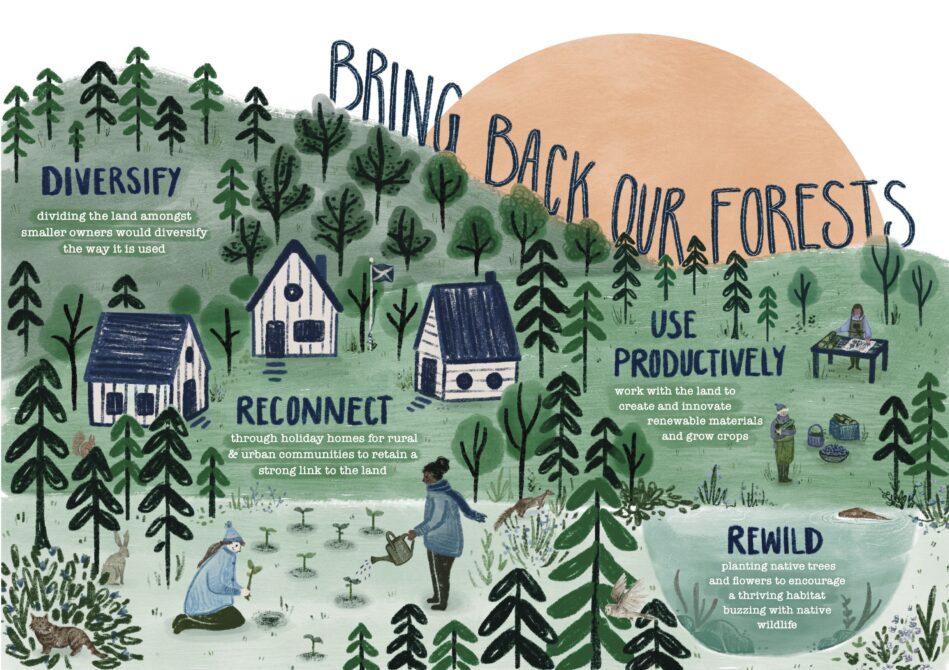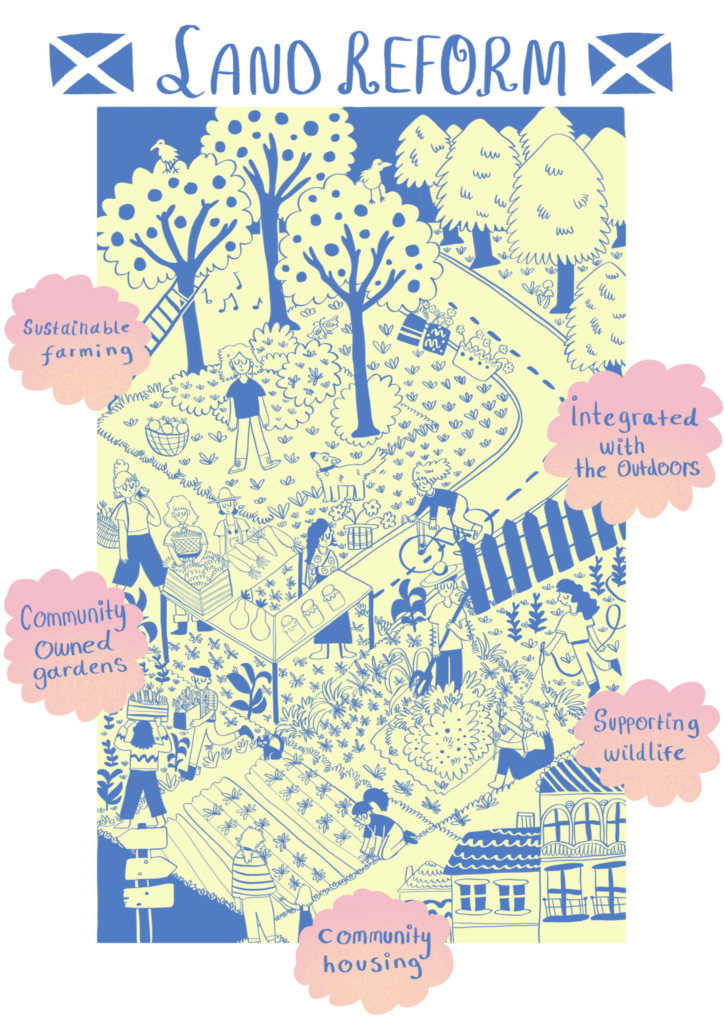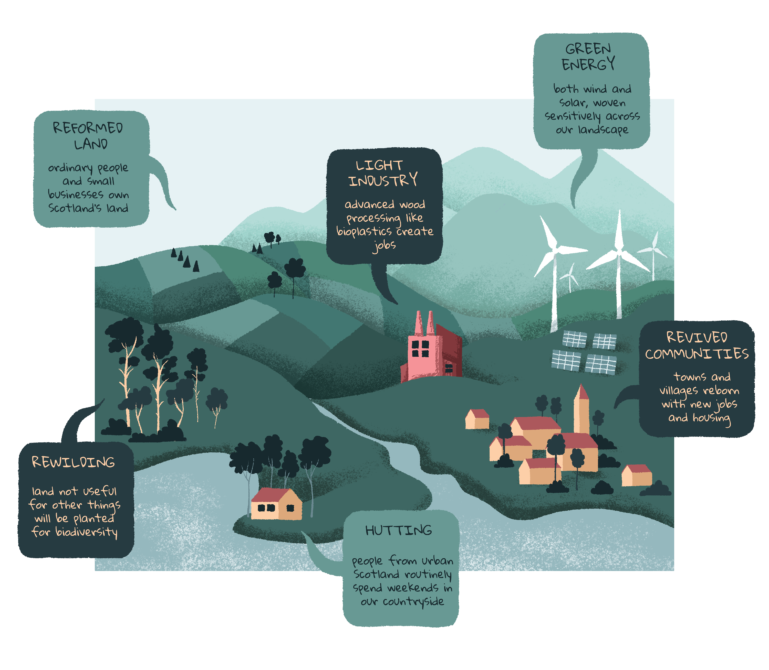Land and Power

“It is about our future. As Scotland. As a nation. As a society. As a community. For hundreds of years people have campaigned for change and for hundreds of years that change has not come. We can be the generation that ends the wait or we can waste another hundred years complaining. Let us choose change. Let’s reform Scotland’s land.”
So argues Our Land – a bold and ambitious plan for land reform published today.
The groundbreaking report outlines a comprehensive vision for reclaiming land in Scotland. The report by the New Economics Foundation and the Common Weal think tank has been described by land reform expert Andy Wightman MSP as ‘the tipping point in the debate”. ‘Our Land’, commissioned by REVIVE the coalition for grouse moor reform, provides an analysis of why concentrated land ownership is harming Scotland; and sets out a comprehensive plan for proper reform.
Duncan McCann from the New Economics Foundation said:
“Significant land reform is vitally important if we want Scotland to be a more equal society as well as address the massive challenges of climate change and rural regeneration. The recommendations contained in this report, all of which can be implemented by the Scottish Government under the existing devolution arrangements, would go a long way towards creating the foundation we need to create the just and prosperous Scotland we all want to see.”

Leading land reform activist, journalist and broadcaster Lesley Riddoch who contributed the foreword for the report said:
“All the recommendations in this landmark report are legal within the existing powers of the Scottish Parliament, in line with international law, practised elsewhere and ready to be enacted now in Scotland. All that’s missing is the political will to mobilise a cross-party alliance, tackle age-old fears of confronting Scotland’s big landowners and finally achieve the transformation dreamed about by generations of our forebears who finally settled for less or took their energy, culture, language and dreams elsewhere.
“Merely tweaking the developed world’s worst landownership system won’t save precious habitats, repopulate the glens or give Scots affordable leisure-time in their own country. This report is a policy roadmap showing how the land question can be tackled and what a normal Scotland might actually look like. I hope it puts land reform right back on the agenda for the Scottish Parliament and its parties.”
The report lays out the litany of some of the negative impacts that the land management practices has on Scotland, including:
- It enables various forms of ‘rent-seeking’ which reduces economic performance and increases economic inequality
- It reduces the capacity for business start-up and business expansion
- It inhibits rural community development and expansion
- It is a key driver of the rural housing crisis and leads to depopulation and the inability of business to source a workforce
- It leads to poor land management which reduces the carbon performance of Scotland’s land and harms biodiversity
- It creates significant power imbalance over influence on rural policy and so distorts Scotland’s democracy
- All of this suppresses Scotland’s human, environmental and economic potential

The report then sets out a package of measures, all within the powers of the Scottish Parliament and legal under international law, which can be used to transform the pattern of land ownership and management in Scotland. The recommendations include:
- Complete a comprehensive land registry to provide full transparency on who owns Scotland’s land
- Introduce some form of land taxation to incentivise better productive use of land
- Reform agricultural and business subsidies to emphasise the quality of land use
- Introduce a cap on the maximum amount of land one ‘beneficial owner’ can own
- Use Compulsory Sales Orders to encourage and where necessary require some landowners to sell land to the public. This can be required to be broken into small plot sizes to enable land access by small and medium-sized businesses, communities and small investors
- Use Compulsory Purchase Orders to buy land for public good purposes
- Extend the planning system to rural land to ensure a public-good criteria for land use
- Give communities a legal right to a say in the planning process for land in their vicinity
- Create a proper system of local democracy in Scotland to empower communities to shape land use
- Introduce a rural housebuilding strategy to tackle the rural housing crisis with communities empowered to address this directly through local democracy
- Reform the regulation of key practices in rural areas such as deer and grouse moor management to require more environmentally-sustainable practices
- Task the Scottish National Investment Bank to create a substantial land investment fund to support start-up and expanding businesses and community development
- Establish a National Land Agency to oversee all of the above
All that is required now is for this vision to be given enough political priority – and create enough of a movement for change to achieve results.
Could radical land reform be a non-constitutional point of unity and convergence for progressive forces in Scotland joining the left, community activists, ecologists and cross party support?

We’re crowdfunding for our future. If you’d like to support us go here: https://www.crowdfunder.co.uk/backing-bella-2021

Uile gun luaidh air a’ Ghàidhlig a dh’aindeoin Bile nan Eilean…
Dha riribh. Ach de eile bhitheadh tu an duil.
All very noble and achievable but why introduce a expensive bureaucratic system to force the transfer of land from the few to the many when all that is required is AGFRR ? It can be introduced under existing powers and avoids public money being used to subside the price landowners get for selling land they failed to steward
No mention in this article of the land and buildings the public sector has failed to steward.
AGFRR?
Annual Ground, Floor, and Roof Rent.
https://annualgroundrent.scot
Is this document about land outside the Highlands and Islands or does it include the land taken during the Highland Clearances?
I dont quite know what you mean Finlay?
Nice ideas with devils lurking in the details. The current system needs change, but we need to be sure we do not change it to something worse or let corrupt officials make a fortune.
“Introduce some form of land taxation to incentivise better productive use of land:
Who decides what is better productive use?
Reform agricultural and business subsidies to emphasise the quality of land use
“Introduce a cap on the maximum amount of land one ‘beneficial owner’ can own”
Sounds stalinist to me
“Use Compulsory Sales Orders to encourage and where necessary require some landowners to sell land to the public. This can be required to be broken into small plot sizes to enable land access by small and medium-sized businesses, communities and small investors”
Given the history of corruption in local and national government I have reservations about the possibility of compulsorily purchased land being sold on the quiet to developers or similar gaming of the system
“Use Compulsory Purchase Orders to buy land for public good purposes”
Define public good and how will you stop families being thrown out of their homes in return for a pittance far less than needed to buy a new home?
“Extend the planning system to rural land to ensure a public-good criteria for land use”
“public good” again
“Create a proper system of local democracy in Scotland to empower communities to shape land use”
There will be a lot of disagreement about what “a proper system of local democracy” means
“Establish a National Land Agency to oversee all of the above”
More civil servants administering something they know nothing about
OK, well a constitutional implementation would have the potential to be much more radical, but perhaps this is a step towards one in future. Constitutionally, you could give rights to non-humans. One impression I got reading this is that the authors might favour significantly increasing the human population of Scotland. Stepping back from the details of the plan, what are the longer-term objectives? Climate seems mentioned in passing, although changes will likely dramatically affect what local species may thrive. So we also have mention of biodiversity and wildlife. If the national biomass of humans is to increase, is that expected to be offset by increases in the biomass of non-human life? Can we get some ballpark estimates here? I am a little concerned about the repetition of ‘land use’. All land has some use to humans, even as a dumping ground or military training camp or post-apocalyptic race-track. Exploitation of land is both aided and constrained by human ‘ownership’. Who or what is going to protect its non-human inhabitants from democracy?
The real game changer is going to be the election of politicians who care about land reform. Currently there is barely a handful in Holyrood.
‘Complete a comprehensive land registry to provide full transparency on who owns Scotland’s land.’
Any land reform programme relies on this, but completing it is potentially very difficult. No land was registered before 1925, and only land that has changed hands since then will have been registered, unless voluntarily registered. Long standing owners will have to be encouraged or obliged to register their land.
Compulsory registration long overdue!
‘Complete a comprehensive land registry to provide full transparency on who owns Scotland’s land.’
Any land reform programme relies on this, but completing it is potentially very difficult. No land was registered before 1925, and only land that has changed hands since then will have been registered, unless voluntarily. Long standing owners will have to be encouraged or obliged to register their land.